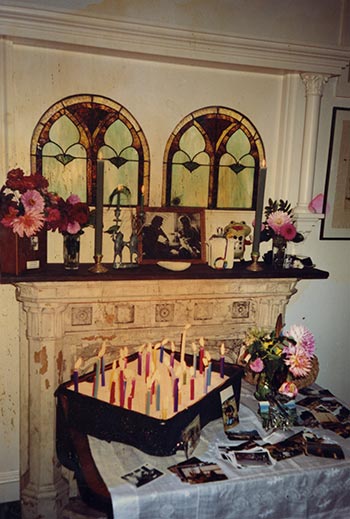Workaday Daddy
Author: Albert d'Ossché
Date/Studio: 1978 Kaye-Smith, Seattle, WA
Engineer: Dave Mathew
Producer: Bill Tootell
Original Release: Crossover (KM308)
Current Release: The Complete Recordings (BSR 158)
 Albert had a successful career as a commercial photographer in Washington DC when I met him. Once he had me pose for him while crouching down in a hole with architectural plans and wearing a hard hat. Shot through a lattice of iron rods, the full-page ad for a building trades publication had the lead-in, “Do Rising Rebar Costs Have You Locked In?” Prophetic. Albert himself felt locked in. The pressure of measuring up to his own and his family's expectations were enormous. He frequently stuttered.
Albert had a successful career as a commercial photographer in Washington DC when I met him. Once he had me pose for him while crouching down in a hole with architectural plans and wearing a hard hat. Shot through a lattice of iron rods, the full-page ad for a building trades publication had the lead-in, “Do Rising Rebar Costs Have You Locked In?” Prophetic. Albert himself felt locked in. The pressure of measuring up to his own and his family's expectations were enormous. He frequently stuttered.
I certainly represented the will-o-the-wisp to Albert. I was free to come and go. I was a minstrel who wrote songs, sang them and moved on. I was an engaging, happy person who observed the world through his music and had no plans to do or be anything else. I was in the flower of Hippie youth. I believed in a fair and just world, karma, and the inevitable consequences of bad intentions and actions. I felt bound only by the duty to call attention to the obvious, a court jester in Richard Nixon's Kingdom.
There is a self-descriptive section about being a minstrel I wrote several years later for In Search of the Wild Dulcimer. “Historically, they've permeated the fabric of mankind and woven it into a greater humanity. They took the thoughts, the events of one place and painted these stories for people of still somewhere else. Their tools were conversation, song, dance, music and perhaps some laughter gathered at the expense of a joke on themselves.” The chapter concludes with, “There is always a place to sleep, some food to eat and sometimes even a little money for people whose lives bring peace.”
That's who I was. Albert could see that. I had no agenda except to try to be genuinely present in the moment and to use music to see both myself and the world around me. I was no saint but I certainly was no sinner-- a work in progress, for sure. There is no doubt, as our history unfolded together (much to his family's chagrin), I was, to pun, the Force Majeur that caused him to cast his lot with music.
Workaday Daddy is Al's apocryphal vision of his own future were he to stay on the set course instilled in him by his upbringing. “Workaday Daddy come home with silver. Workaday Daddy, come home alone. You once were a young man-- so old at twenty-- finding your manhood in paper and glass. Now you can come home, cry on the Metro, looking for kindness in a wasteland pastel.” He saw himself shuffling paper in a glass tower day after day as turnstiles ticked away his life. Bleak.
On the Crossover recording, producer Bill Tootell got to pull out all of the stops and go for the rock and roll, doom and gloom core of the song. As an early fan and college promoter of Captain Beefheart's music, this was fine by Al. It was our first album as a singer-songwriter duo. We hadn't been branded yet as just folk musicians. We both still had top-forty fever. Aerosmith was recording in the studio next door. One of our back up singers was a Heart sister. The album title, Crossover, was an industry term describing the taking of one genre of music and crossing over into another-- folk to pop rock.
Ted Brancato laid down a pounding piano track over Al's and my driving dulcimers. It's too bad we didn't have electrics back then but we wrung as much out of the dulcimers as we could acoustically. Dave Peterson laid down a screaming electric guitar track that cried and moaned, railing against fate's injustice. Linda Ring added her thick, smoky vocal, blending between mine and Al's. But gloom no longer resonated with audiences in the early 80s. It never charted. We stopped playing it soon after.
The song did act as a catharsis for Albert to leave DC and to seek a different life path through music. Twenty years later he managed to fold this path together with his earlier one by becoming a producer in Hollywood for New World Pictures. His stuttering diminished although it never went completely away. It was never present when he sang. “Just like Mel Tillis,” he would often quip. Rest in peace, Flaco.
